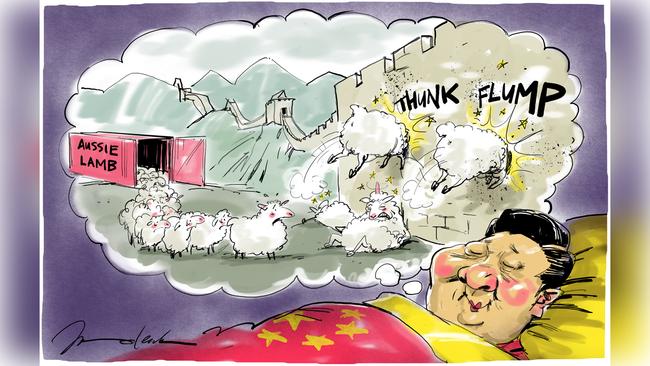Stick to the rules and play the long game on China

As we report on Thursday, concerns are mounting that restrictions on imports of Australian cotton and wheat could be next. When the foreign relations bill was first mooted, China signalled its displeasure by banning exports from family-owned meat processor John Dee in August. There is now a long list of Australian producers caught up in a potent mix of Chinese domestic politics that requires President Xi Jinping’s vision of his nation’s powers to be exported, respected and obeyed. Although the foreign relations bill does not mention China, it was sparked by concerns about the Victorian government’s decision to engage with Beijing on the Belt and Road Initiative. The bill also will allow the federal government to oversee agreements between Australian universities and China.
As trade tensions have escalated, China through its diplomats has chosen to take the low road with fake tweets disparaging of Australian soldiers in Afghanistan. The evidence is this overt behaviour might have played well to a domestic audience in China but it has galvanised sentiment against the Chinese Communist Party leadership abroad. In the face of the tweet, the federal opposition was forced to drop its proposed amendments to the foreign relations legislation to include a register of decisions and judicial review.
In contrast to China’s histrionics, Australia has maintained a principled stance, lodging its grievances with the World Trade Organisation and continuing to stand firm in the face of escalating provocations by its major trading partner. Trade Minister Simon Birmingham has accused Beijing of undermining the “letter and spirit” of the China-Australia Free Trade Agreement and its obligations under WTO rules. He said China’s imposition of “disruptive and restrictive measures” on a wide range of Australian goods and services in recent months was in violation of the 2015 agreement. In a letter to the Senate, Senator Birmingham said China was ignoring measures under ChAFTA requiring regular meetings and review. Lack of engagement by China in recent years had prevented the use of WTO structures.
At a November 25 WTO meeting, Australia raised China’s treatment of Australian barley, wine, meat, lobsters, logs, coal and cotton, and said it was “considering all dispute settlement options”. China is unlikely to be overly concerned about any actions taken by Australia via the WTO. The trade hostilities have merely confirmed what critics have long argued — that China does not respect international trade norms or value rules-based systems in general.
The immediate lesson for Australia is to take a leaf from the book of its errant trading partner and continue to play the long game. While the impact of the immediate trade bans may be difficult for those caught up in restrictions, from a national perspective trade figures between Australia and China continue to be in rude health overall. This is because of booming prices for the commodity China needs most from Australia, iron ore. There is further evidence that punitive measures taken against Australian coal exports have resulted in sharp price increases for China as it seeks product from other markets. Official figures released by China on Monday revealed Australia’s exports to China in the first 11 months of the year were $142bn, down 4 per cent on the corresponding period in the previous year, despite the pandemic.
There are forces within China’s political elite that are more reform-minded than Mr Xi. It is reasonable to expect that relations between Australia and China eventually will return to a more even keel. In the meantime, as Rowan Callick wrote on Saturday, we are living through the implementation of Mr Xi’s new doctrine of Thoughts on Socialism With Chinese Characteristics for a New Era. Callick says this is an era in which China’s rulers feel that it now has enough economic heft, enough military might, enough ultra-modern infrastructure and enough robust institutions — all directed by the party with its clear line of command — to go it alone. Australia is not the only country experiencing trade coercion from China as it seeks to demonstrate its new power for the benefit of a domestic and regional audience. As Callick wrote, in Mr Xi’s new order, China wants to be surrounded by “tribute states” that defer to it as the paramount power and that in return are offered its shield of security and economic opportunity.
Australia’s refusal to play ball is proving irritating for China’s current leadership but it should have been expected from a nation that values freedom and puts issues of sovereignty over mercantile pursuits. China’s bigger trade dispute with the US no doubt will occupy more of Beijing’s thinking soon. Australia is best served sticking to the rules-based order, maintaining links with moderate political forces in Beijing and reminding China’s people that there is no dispute with them.







It should be no surprise that the passing of Australia’s foreign relations bill through parliament on Tuesday has been followed by fresh trade sanctions from China. Immediately after the bill passed, with Labor withdrawing its proposed amendments, China slapped new import restrictions on meat exports from Queensland-based abattoir Meramist. Beijing also has banned timber from two more states and spread trade disruption to Australia’s $780m lamb export industry.